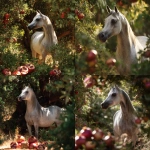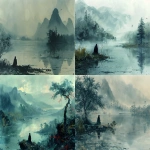Explore the Best AI Image Gallery

Pixelated Dreams: AI Image Generation and the Future of Marketing
The world of marketing is undergoing a rapid evolution, fueled by advancements in artificial intelligence. One of the most fascinating developments in this space is AI image generation, a technology capable of producing stunning visuals with remarkable speed and efficiency. From captivating social media graphics to eye-catching website banners, AI-generated images are poised to revolutionize how brands connect with their audiences.
A Creative Canvas Unleashed
At its core, AI image generation empowers marketers with an unprecedented level of creative control. Tools like DALL-E 2, Midjourney, and Stable Diffusion allow users to generate unique visuals by simply providing textual descriptions, known as prompts. This opens up a world of possibilities for crafting bespoke marketing materials that resonate with specific target demographics.
- Personalized Content: AI can tailor images to individual preferences, creating highly personalized marketing experiences that enhance engagement.
- Cost-Effective Solutions: By automating the image creation process, brands can significantly reduce costs associated with hiring freelance designers or purchasing stock photos.
- Rapid Prototyping: Marketers can quickly iterate on different visual concepts, experimenting with various styles and aesthetics to find the perfect fit.
Beyond Aesthetics: The Impact on Marketing Strategy
The influence of AI image generation extends far beyond simply producing aesthetically pleasing visuals. It has the potential to reshape marketing strategies across various domains:
- Social Media Engagement: Generating eye-catching, shareable content can drive increased engagement and brand awareness on platforms like Instagram, TikTok, and Twitter.
- Email Marketing: Personalized images in emails can enhance open rates and click-through rates, leading to more effective campaigns.
- Website Design: AI-generated visuals can create a more dynamic and engaging user experience, enhancing website aesthetics and driving conversions.
Navigating the Ethical Landscape
While the potential of AI image generation is undeniable, its crucial to address the ethical considerations surrounding its use in marketing:
- Copyright and Ownership: Questions arise regarding the ownership of AI-generated images, particularly when they draw inspiration from existing works.
- Bias and Representation: AI algorithms can inadvertently perpetuate biases present in training data, leading to potentially harmful or discriminatory representations.
- Transparency and Disclosure: Its important for brands to be transparent about the use of AI-generated images and provide clear disclosures to consumers.
The Future of AI Images in Marketing
As AI technology continues to advance, we can expect even more sophisticated and versatile applications in marketing. Some future trends include:
- Hyper-Personalization: AI will enable the creation of images tailored to individual user preferences, demographics, and browsing history.
- Interactive Visuals: Images will become more dynamic and interactive, responding to user input and creating engaging experiences.
- Integration with Other Technologies: AI image generation will seamlessly integrate with other marketing tools, such as CRM systems and social media platforms.
The rise of AI image generation marks a turning point in the marketing landscape. By embracing its potential while navigating the ethical challenges, brands can unlock new levels of creativity and connect with consumers in more meaningful ways.
](https://images.ai-img.art/thumbnails/150/baf01e7f997f5bc030aa10831575d8b879a4a6755830df4bcd3dcc93346ef1dd.webp)

](https://images.ai-img.art/thumbnails/150/56d08b81b5991eca46f50c80b41db4e9ac06c775cbbf5138ea0734d93390316a.webp)


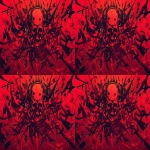










](https://images.ai-img.art/thumbnails/150/4dfe5499f7f4f9e5aa1613199c58710634f2cba5f57ac7e6717c1d56a9864e1a.webp)
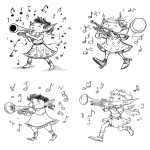


](https://images.ai-img.art/thumbnails/150/e407417f3921a9491278afc6484ec26f3ae374d4543e1a56898e8bcb1e41a0da.webp)








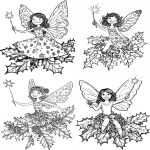


](https://images.ai-img.art/thumbnails/150/fd852e87169bf2f63982b31f7f16a8fa335d75d9536fd48c2b87c7d4b035fa7c.webp)



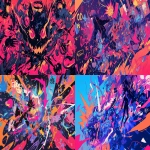




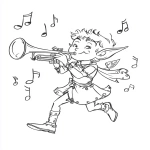
](https://images.ai-img.art/thumbnails/150/ed631f35091268316da1950d8f24949cf71c41220d75ddecc89232e1c28f3653.webp)

